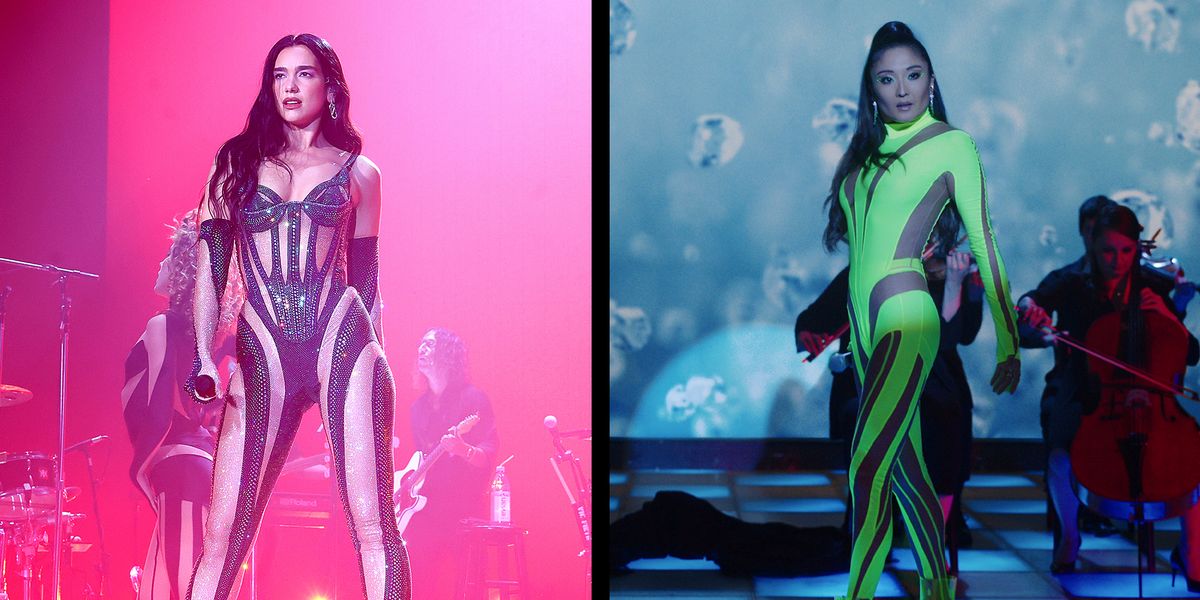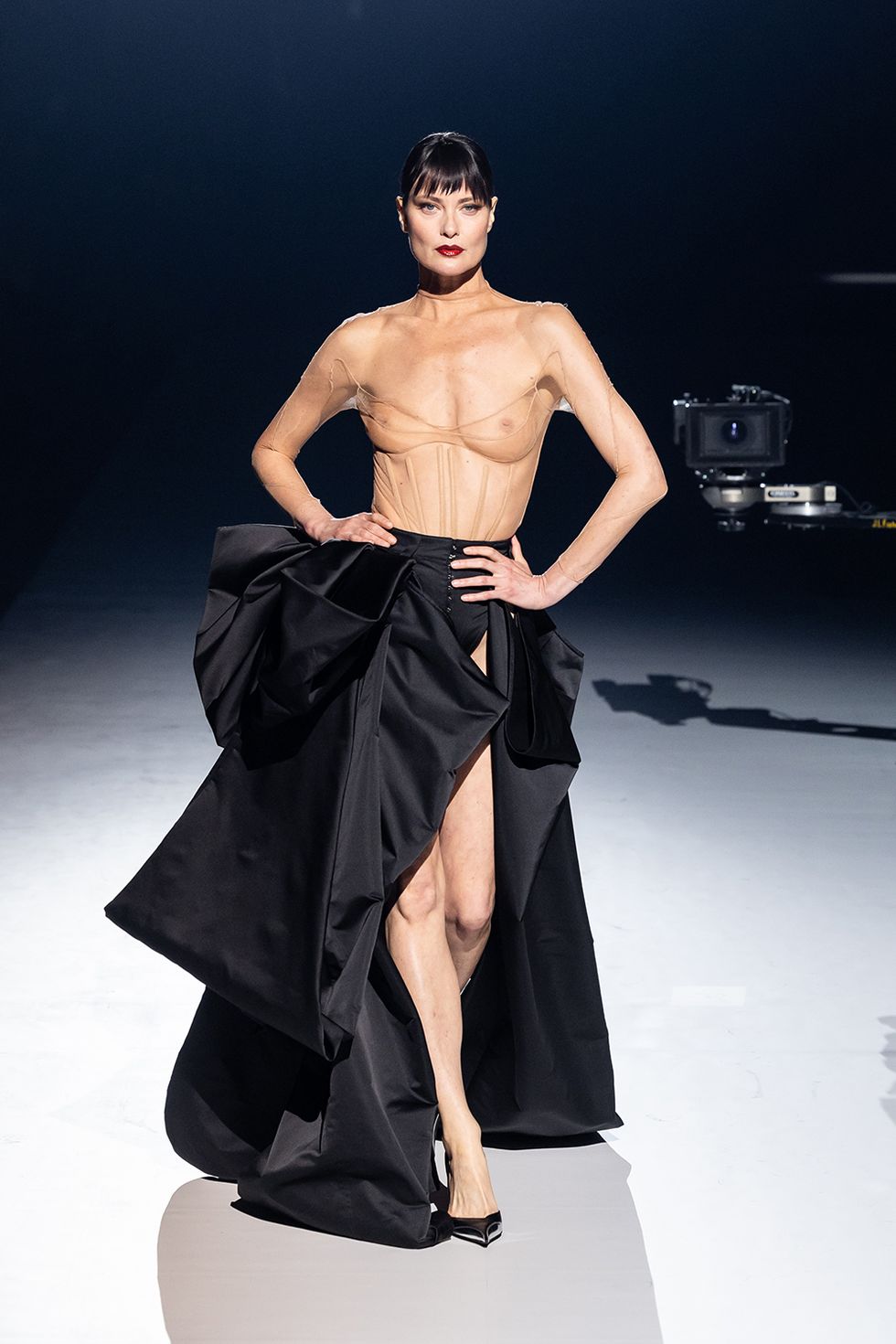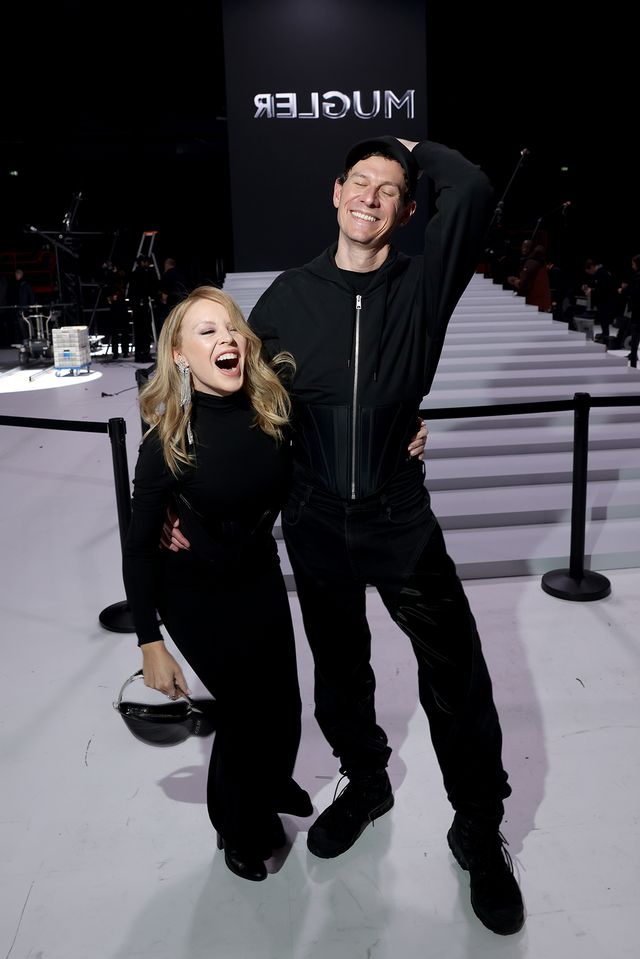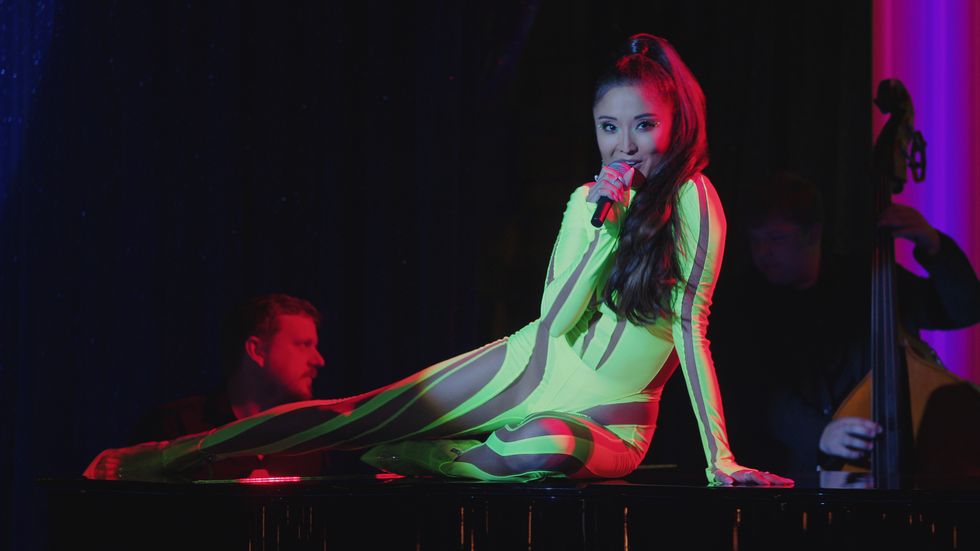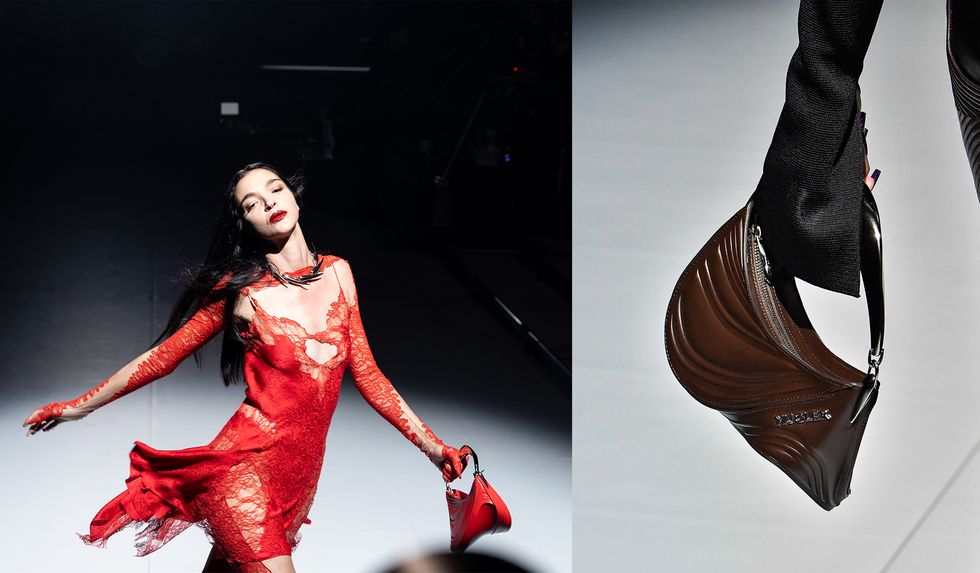Commerce and haute couture usually sit at completely opposite ends of the spectrum, but on the last night of shows in Paris, the two collided at full throttle. Mugler creative director Casey Cadwallader didn’t only close out the week, he shut it down with an exuberant see now, buy now, drama-filled supermodel spectacular.
In case you missed it, the show paid homage to George Michael’s iconic “Too Funky” video, which famously starred Eva Herzigová, Linda Evangelista, Tyra Banks, and a whole lot of Mugler. Herzigová closed the Cadwallader version, which featured Mugler women past and present—Amber Valetta, Shalom Harlow, Irina Shayk, Paloma Elsesser, Anok Yai, and Debra Shaw, to name several, alongside performance artists like Alejandra Ghersi (a.k.a. Arca) and comedian Ziwe—all deposited onto the runway via roving camera dollies with their every move broadcast on a giant screen.
Cadwallader’s body shape-agnostic bodysuit, in all manner of derivations thereof—evolved via stretch lace panelling (“a bitch to work with,” according to the creative director himself)—insinuated itself throughout. The commercial edit is currently available to shop on Mugler’s website.
“I was transporting the idea of the fashion film onto the runway,” he said of the staging. “In the last few years, I Iearned how to unleash Mugler through film, and the idea of going back to the runway the standard way was not going to happen.”
Let’s back up for some context. Cadwallader took the reins at Mugler in 2017, and his last in-person show was February 2020, pre-pandemic. Since then, he has been presenting his collections via a trilogy of films—the most recent of which featured Bella Hadid, Megan Thee Stallion, and Chloë Sevigny, among others (it has amassed over 15 million views and counting on YouTube)—all the while creating custom stage and screen looks for artists including Dua Lipa, Cardi B, and Beyoncé.
Cadwallader compares such bespoke, performance-geared creations to a new form of couture—albeit where the stage takes the place of the runway and the high net worth client is the artist. “They call me and say, ‘This is what I’m doing; I want gold, what have you got?’ And then I do 80 sketches in gold and send them over, and we talk about how they need to move. That’s couture. It’s made to measure for a purpose and for a desire.”
He’s also conscious about translating these custom looks into his commercial pieces. “I love that people want things, and I want to give it to them—someone young (think: Ashley Park’s Mindy Chen in Emily in Paris season 3, writhing on the La Trompette Bleue piano in a neon bodysuit with cut-out panels and leggings), who wants something to wear to the club and wants to be like Dua Lipa. I want to give them the version without the Swarovski crystals so they can have it too.” And, in this case, have it now.
The show’s inanimate, not to mention resoundingly commercial, star was the twisted Spiral Curve 01 bag (drawing on Cadwallader’s signature spiral jeans and paneled leggings) which dropped on the Mugler site just prior, also marking the launch of a new product category for the brand.
It generated some drama of its own. As well as being carried down the runway, said bag was also toted by front row guests such as Lisa Rinna, who had just exited The Real Housewives of Beverly Hills and grabbed a mike to deliver her “I fucking came out owning it, baby” catchphrase following a prompt from Ziwe, and JT, whose bag unceremoniously snatched during the show—primed by Cadwallader to ensure it was “a real tug,” he said later.
Elsewhere, Cadwallader also guided the collection in “different directions” with “more volume, more texture, more streetwear and, at the same time, more evening,” only without the gowns. Because, let’s face it, a gown brand, Mugler is not. Instead, he deconstructed the notion and played with its elements in the form of the overblown bows that animated tuxedos, minidresses, bodysuits and barely-there bustiers in the case of Shalom Harlow’s ensemble. A further category under development is shoes—coming soon, he assures us.
In summer 2020, the house announced a gradual pivot to its see now, buy now format. Or, as managing director Pascal Conte-Jodra puts it: “see now, buy now, wear now” in that it’s available right away, as opposed to just for pre-order. “We are focused on customer experience, the idea of ‘I want it all and I want it now’ is very important to us,” he said of the new model. He’s also revised the distribution schedule to two collections a year, to give product a longer shelf life while creating newness via additional drops throughout the season.
The show took place a year and three days after the death of the brand’s namesake founder. Thierry Mugler stepped away from his label in 2001 to focus on his theatrical work—notably Beyoncé’s costumes for her 2009 “I Am…” world tour—a passion shared by Cadwallader. The opening of the traveling blockbuster exhibition “Thierry Mugler: Couturissime” at the Montreal Museum of Fine Arts in 2019 (currently showing at New York’s Brooklyn Museum), unleashed renewed interest in his archival looks—not least from Cardi B, who wore his 1997 Birth of Venus dress to the 2019 Grammy Awards—while Kim Kardashian coaxed him out of retirement to create her 2019 Met Gala dress. By that point, Mugler mania had reached fever pitch.
Regarding the timing with the end of haute couture week, “it was a ballsy move,” but also a pragmatic one, capitalizing on the fact that an audience was already assembled, Cadwallader admitted. “But then I saw the headlines saying that Mugler was closing couture week and I was like, ‘oh shit,’” he laughed.
“Mugler is not to be quiet,” he added by way of explanation. “It’s to be bold and to be exciting and to have some drama and to dare to do something iconic again.” Fittingly, the finale played out in a “Too Funky”-esque runway dance-off that segued into a roof-raising after-party. Mission accomplished.
